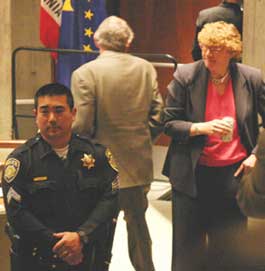home | metro santa cruz index | columns | nūz

Photograph by Leyna Krow
Agent of the Administration: Denice Denton and a uniformed police officer at a protest of UC regents meeting last spring.
Nūz
Somebody's Gotta Keep an Eye on Those Kids
UC-Santa Cruz's now famous victims of Pentagon spookery, Students Against War (SAW), met with Chancellor Denice Denton on Jan. 24 to discuss concerns that the feds might not be the only ones monitoring student activities.
Back in December, when it came to light that the Pentagon had been monitoring antiwar demonstrations at a number of universities, including SAW's April 5 counter-recruitment action, Denton expressed her dismay ("Incredulous Requests," Nüz, Jan. 18) in the January issue of the campus' administrative newsletter, Currents. But despite Denton's protestations, many students suspect the university has been doing its own surveillance of student political activities for quite some time.
"We've gotten so much support from the administration over the Pentagon issue," says SAW member David Zlutnick. "They have backed us very strongly in terms of government surveillance. But we want to bring up concerns about internal surveillance as well."
To address such questions, SAW presented Denton with documents detailing concerns about university-sanctioned spying, including photos of undercover police officers at rallies and an account of a university official attending planning meetings disguised as a student activist.
As stated in SAW's findings, "It is not clear who this agent of the administration may have been, but it is clear that they did not identify themselves to student organizers, and thus, acted in the capacity of a spy."
UCSC police captain Nancy Carroll denies police involvement in undercover surveillance of students. "We did attend one of SAW's meetings, but we went in uniform," Carroll said. "After a few minutes, they asked us to leave, so we did."
SAW, however, maintains accusations of foul play.
"Denton didn't say too much about campus surveillance and the campus police have always denied it in the past," says Zlutnick, who fears that much of the Pentagon's information about SAW may have come from local law enforcement through a federal monitoring program by the creepy name of TALON (Threat and Local Observation Notice).
According to the ACLU, TALON has been used to obtain information about GreenPeace, PETA--oh yes, and a group that handed out free peanut butter and jelly sandwiches to Halliburton employees in Texas. The program's stated primary purpose is, of course, counterterrorism intelligence.
"It's hard for us to believe that the Pentagon didn't receive its initial information from local sources," says SAW's Jen Low. That said, who exactly those local sources may have been remains a mystery.
"Chancellor Denton said that she'd like to know where this information came from as well," said Low. "So we're approaching this as a collaborative effort."
SAW hopes to meet with members of the university's administration again within the next few weeks to continue investigations.
... And the Rest Of Us, Too
Meanwhile, following revelations that Bush has been illegally wiretapping U.S. citizens for years, Nüz began to wonder if local Internet providers became suspicious somewhere along the way that this stuff was going on. (Hey, did all those sales calls from Bombay put us on some international terrorist watch list, and does emailing your friends comments like "It's da bomb!" about a DVD you really like trigger an orange wiretap alert over at the NSA?)
Concerned, we called Cruzio co-founder Chris Neklason, who in our April 21, 2004, Freedom Unplugged cover, worried that a new FBI plan would force him to allow spying on local Internet users---or give up his business altogether.
Neklason says Cruzio the company has "no suspicions" per se.
"But of course we all 'know' that whatever the president wants to do, he/she can find a way to do," says Neklason, noting that "from a technical standpoint, we need not be involved for the NSA, say, to 'tap' the communications of our customers. All they need to do is place a "packet sniffer" (a common network diagnostic tool) somewhere on the physical circuit between our customer and whomever they are in communication with."
As Neklason explains, because Cruzio's customer network traffic comes over SBC/ATT phone lines between the customer computer and Cruzio's routers, and thence to the net, a tap can be placed on the actual SBC/ATT circuit in one of their facilities.
"Which is in fact what I gather is being done and is an extension of the way analog phone line wire taps are already carried out now," says Neklason, insisting that "it's actually very hard for a criminal to deploy a packet sniffer like this" and that "the feds can only do it with the cooperation of the telcos."
Admitting that Cruzio gets a couple/few subpoenas a year from the FBI, Neklason says he personally doesn't have a problem with wiretaps--as long as there are checks and balances and a judge signs the subpoena.
"Unfortunately, recent revelations indicate that, in some cases, that oversight process is being circumvented and we are left to trust the unilateral judgement of the president/NSA," says Neklason. "It's an exercise for the reader to decide whether or not that level of trust is warranted, eh?"
Send a letter to the editor about this story.